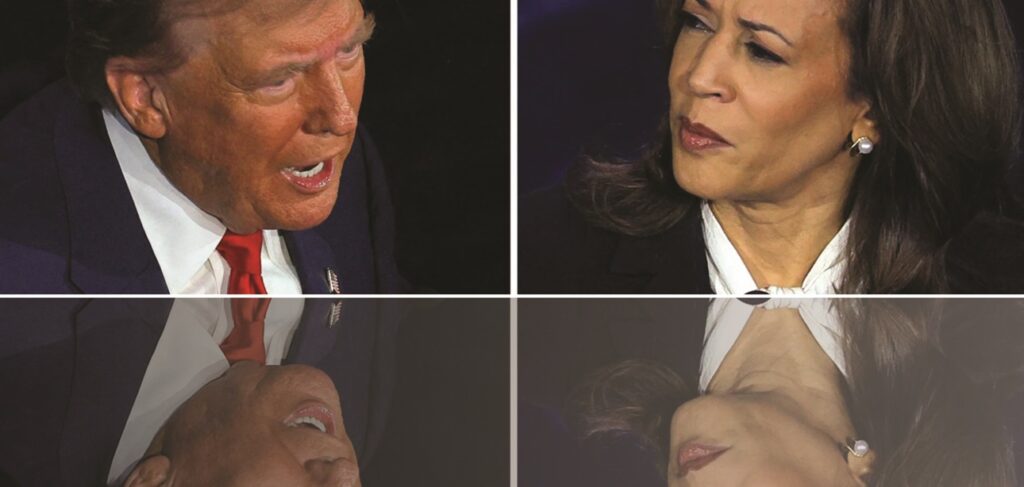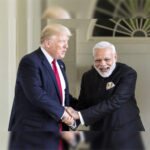By C.J. Atkins
WASHINGTON: Watching the Harris-Trump debate, an old idiom came to my mind: “Don’t judge a book by its cover.” Karl Marx had another way of saying much the same thing: “All science would be superfluous if the outward appearance and the essence of things directly coincided.”
And since Trump called Harris a “Marxist” (though she’s anything but), why not take an actual Marxist look at the debate? Shining a light on the divorce between the way things may look on the surface (their appearance, or form) and their underlying reality (essence, or content) is a central part of dialectical materialism.
Marxists, the real ones, always try to avoid being taken in by appearance, which the ruling class uses to hide or distort the real essence of things. Just a few examples make the point: free labor market / capitalist exploitation, political democracy / institutionalized power and privilege.
Applying this methodology to the presidential debate, there are a few observations that can be made. When it comes to appearance, most corporate media commentators and political operatives from both of the mainstream parties – yes, even many Republicans – have trumpeted Harris as the runaway winner.
She was calm, in command, and coherent (a relief after the Biden-Trump matchup a few months ago). On abortion, she ripped her opponent, delivering blows that no male candidate could probably match in intensity and authenticity. On the need to protect constitutional democracy from another Jan. 6th, Harris effectively painted Trump as a threat and coup-plotter.
Trump, by contrast, was Trump. He flailed around from one lie to another, blared racist dog whistles through a megaphone, and was obsessed with matters relating to his own ego. He was easily triggered by Harris’ comments about rally sizes, felony convictions, and her claims that people are laughing at him. Again and again, he fell into the vice president’s trap.
If the nation was sitting at a meeting of the high school debate club and tallying up the score, then yes, Harris owned the night. It was the steady-handed forward-looking leader against the unhinged and dangerous fascist. Mission accomplished.
But if we go past those surface-level assessments, beyond the appearance of things and dig into the content of the debate, the picture gets a little more complicated.
On immigration, Trump endlessly pivoted to his well-worn tropes of violent and job-stealing migrants invading the country, beefed up this time with the absurd claim that Black Haitian immigrants are stealing and eating people’s pets in suburban Ohio. He’s a racist and a demagogue, which readers of this publication know all too well. Compared to that, it’s easy to shine, even by saying very little.
Harris made no mention of comprehensive immigration reform; rather, she talked of adding more border patrol agents. She mostly limited her remarks to talking up the bipartisan bill that Republicans refused to pass in February. It didn’t differ all that much from previous Republican and Trump approaches (minus the wall), but GOP lawmakers rejected the bill for not being anti-immigrant enough. Encouraged by Trump, they also wanted to deny the Democrats any chance of a “win” on immigration.
When it comes to the economy, there wasn’t a whole lot for working-class and poor people in this country to get all that excited about in the debate. Trump repeated his go-to economic mantra of tax cuts for billionaires (which Harris rightly hit him on) and the false promise of creating jobs via a trade war against China.
The Democratic nominee herself, though, was quite thin on economics, perhaps choosing to go light on an issue for which most polls still give the edge to Trump.
She mentioned the Democrats’ $6,000 child tax credit for families with newborns and the promise of up to $25,000 in down payment assistance for buying a home. Both are positive proposals, as far as they go, but they hardly constitute a real economic “plan” at a time when millions are struggling with stagnant wages, inflated prices, and slow job growth.
Neglecting to talk about the role of corporate price-gouging in driving inflation and inequality was a missed opportunity, and bragging about how a big bank like Goldman Sachs positively evaluates her economic plan didn’t really help matters, either.
Added to Harris’ reduction in the capital gains tax rate from Biden’s proposed 44.6% to 28% and a pledge to keep corporate taxes lower than they were pre-Trump, there’s not a lot to work with here if you want to assemble a working-class economic program.
Questions like the ones pushed by the Poor People’s Campaign ahead of the debate —“What’s your plan to address the needs of 140 million poor and low-wage people of this nation?”— were ignored by the television network moderators. If they’d been asked, perhaps Harris would have had the chance to put more meat on the bones.
On health care, Trump does have a plan, even though he didn’t expound upon it Tuesday night. It includes the further starvation of Medicare and Medicaid, free reign for price-gouging pharmaceutical and insurance companies, and privatization.
On the other side, Harris deserves credit for defending Obamacare, protecting people with pre-existing conditions from losing their insurance, and the Biden administration’s drug price negotiations that have made some medicines cheaper. Her defense of private insurance companies and the retreat from her past support of Medicare for All, however, suggest there’s no reason to expect any new big progress on the issue should she win the election.
One policy area where the Democratic candidate’s remarks were anything but bare, though, was foreign affairs. Again, the danger to peace posed by another Trump administration is well-appreciated by progressives and those on the left. He talks an isolationist talk while aligning with right-wing dictators and implies he will be an even stronger supporter for Israeli Prime Minister Benjamin Netanyahu’s genocidal war than Biden has been.
But what about Harris? On the most pressing issue of Gaza, there was nothing new. In essence, she promised to continue arming Israel no matter what atrocities its armies may commit. There were acknowledgments of the scale of Palestinian suffering, to be sure, and a pledge to “continue to work around the clock for a ceasefire,” but it was the Biden status quo in every way that matters.
Harris also glowed when talking about NATO as “the greatest military alliance ever known,” indicating that the expansion of U.S. control over Europe and confrontation with Russia remain top goals and that the war in Ukraine will probably drag on.
Carrying on the new Cold War against China – a key priority of U.S. imperialism no matter which party is in power – showed up as an area of overlap, with differences between the two candidates being largely ones of style.
Trump praised himself for imposing trade tariffs on China, which Harris characterized as a “trade war” and a “Trump sales tax” while dodging the sticky issue of why the Biden administration left them all in place if the Democrats really thought they were bad policy. In the end, it was a debate over who would be better at putting the U.S. on the path toward conflict in East Asia.
Did Harris say what she has to say to get elected in an America where money, big business, and the military-industrial complex constrain the possibilities of what are possible under this capitalist system? On many issues, the answer is of course yes, and progressives and the left have to keep that reality in mind. That’s no reason to be satisfied and let right-wing policies pass without comment or struggle, though.
Harris completed the task of demolishing Trump rhetorically, but it’s very possible that the Washington pundit class is overly excited in declaring her the obvious winner. The 2016 Clinton-Trump debate stands as a warning: Trump was clobbered in the debate but still won the election, at least in part because the Democratic campaign did not go very far in laying out a program to address the needs of working people.
Trump once more made it obvious why he has to be defeated and the path toward fascism blocked, and Harris set a clear contrast on issues like abortion and constitutional democracy. But many of the other policies she outlined (or didn’t) also prove, once again, that the organized labour and people’s movements’ work must continue after November .5, elections no matter the outcome of the vote.
We have to stay on offense and be prepared for defense. (IPA Service)
Courtesy: People’s World




 So Far Harris Trumps Donald And That Is None Too Good For Narendra Modi
So Far Harris Trumps Donald And That Is None Too Good For Narendra Modi 